 W
WAbu Salim prison is a maximum security prison in Tripoli, Libya. The prison was notorious during the rule of Muammar Gaddafi for alleged mistreatment and human rights abuses, including a massacre in 1996 in which Human Rights Watch estimated that 1,270 prisoners were killed.
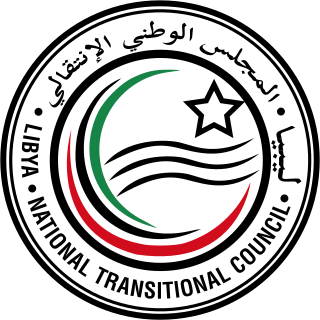 W
WThe aftermath of the First Libyan Civil War has been characterized by marked change in the social and political order of Libya after the overthrow and killing of Muammar Gaddafi in the civil war that was fought in Libya in 2011. The country has been subject to ongoing proliferation of weapons, Islamic insurgencies, sectarian violence, and lawlessness, with spillovers affecting neighboring countries including Mali.
 W
WAnsar al-Sharia in Libya was a Salafist Islamist militia and Al-Qaeda-aligned group that advocated the implementation of Sharia law across Libya. Ansar al-Sharia came into being in 2011, during the Libyan Civil War. Until January 2015, it was led by its "Amir", Muhammad al-Zahawi. As part of its strategy, the organization targeted specific Libyan and American civilians for death and took part in the 2012 Benghazi attack. The group was designated as a terrorist organization by the United Nations, Iraq, Turkey, the United Arab Emirates, the United Kingdom and the United States.
 W
WThe anti-Gaddafi forces were Libyan groups that opposed and militarily defeated the government of Muammar Gaddafi, killing him in the process. These opposition forces included organized and armed militia groups, participants in the Libyan Civil War, Libyan diplomats who switched their allegiance from the Gaddafi-led government, and Libyan military units that switched sides to support the protestors.
 W
WBab al-Azizia is a military barracks and compound situated in the southern suburbs of Tripoli, the capital of Libya. It served as the main base for the Libyan leader Muammar Gaddafi until its capture by anti-Gaddafi forces on 23 August 2011, during the Battle of Tripoli in the Libyan Civil War.
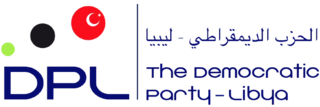 W
WThe Democratic Party is a political party in Libya launched by the Libyan Freedom and Democracy Campaign on 14 July 2011 to represent the aspirations of the Libyan people in post-Gaddafi and post-National Transitional Council elections.
 W
WThe February 17th Martyrs Brigade is an Islamist militia in Libya.
 W
WThe Fist Crushing a U.S. Fighter Plane Sculpture is a gold-coloured monument located in Misrata, Libya. It was once located at the Bab al-Azizia compound in the Libyan capital of Tripoli. The sculpture was commissioned by the nation's leader, Colonel Muammar Gaddafi following the 1986 bombing of Libya by United States aircraft. It was built in the shape of an arm and hand squeezing a fighter plane. It may have been designed to symbolize the apparent downing of an F-111 by Libyan anti-air units in the 1986 bombing.
 W
WGaddafi loyalism consists of sympathetic sentiment towards the overthrown government of Muammar Gaddafi, who was killed in October 2011. It has not been responsible for the ongoing Libyan crisis and its ongoing violence in Libya, though the degree of its involvement has been disputed in a number of instances.
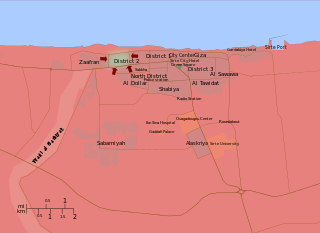 W
WMuammar Gaddafi, the deposed leader of Libya, was captured and killed on 20 October 2011 during the Battle of Sirte. Gaddafi was found hiding in a culvert west of Sirte after his convoys were attacked by NATO's aircraft. He was then captured by National Transitional Council (NTC) forces and was killed shortly afterwards.
 W
WGiuliana Bridge is a bridge in Benghazi, Libya. It has a three-span main structure which was originally built in the 1970s but was rehabilitated in 2005 by Bilfinger Berger.
 W
WBy the end of February 2011, medical supplies, fuel and food were dangerously low in Libya. On 25 February, the International Committee of the Red Cross launched an emergency appeal for US$6,400,000 to meet the emergency needs of people affected by the violent unrest in Libya. On 2 March, the ICRC's director general reminded everyone taking part in the violence that health workers must be allowed to do their jobs safely.
 W
WThe Khamis Brigade, formally the 32nd Reinforced Brigade of the Armed People, was a regime security brigade of the Libyan Armed Forces loyal to Muammar Gaddafi, the official leader of Libya from 1969 until 2011. The 32nd Brigade was commanded by Gaddafi's youngest son, Khamis Gaddafi and was called "the most well-trained and well-equipped force in the Libyan military" and "the most important military and security elements of the regime" in leaked U.S. memos.
 W
WThe Libya Shield Force is an armed organisation formed in 2012 out of anti-Gaddafi armed groups spread throughout Libya. The Libyan parliament designated much of the Libya Shield Force as terrorist and elements of the Libya Shield Force were identified as linked to al-Qaeda as early as 2012.
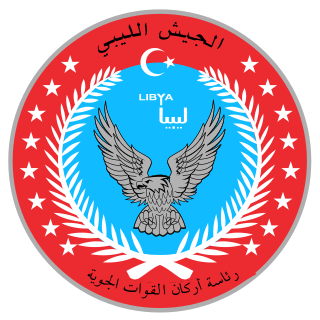 W
WThe Libyan Air Force is the branch of the Libyan military responsible for aerial warfare. In 2010, before the Libyan Civil War, the Libyan Air Force personnel strength was estimated at 18,000, with an inventory of 374 combat capable aircraft operating from 13 military airbases in Libya. Since the 2011 civil war and the ongoing conflict, multiple factions fighting in Libya are in possession of military aircraft. As of 2019 the Libyan Air Force is nominally under the control of the internationally recognised Government of National Accord in Tripoli, though the rival Libyan National Army of Marshal Khalifa Haftar also has a significant air force. In 2021, the air force is under command of the new President of Libya, Mohamed al-Menfi that replaced Fayez al-Sarraj.
 W
WThe Libyan Army was the branch of the Armed Forces of the Libyan Arab Jamahiriya, the Libyan Arab Republic and the Libyan Kingdom responsible for ground warfare.
 W
WThe First Libyan Civil War was an armed conflict in 2011 in the North African country of Libya which was fought between forces which were loyal to Colonel Muammar Gaddafi and rebel groups that were seeking to oust his government. It erupted with the Libyan Revolution, also known as the 17 February Revolution. The war was preceded by protests in Zawiya on 8 August 2009 and finally ignited by protests in Benghazi beginning on Tuesday, 15 February 2011, which led to clashes with security forces that fired on the crowd. The protests escalated into a rebellion that spread across the country, with the forces opposing Gaddafi establishing an interim governing body, the National Transitional Council.
 W
WThe Libyan Freedom and Democracy Campaign was a secular political group during the Libyan Civil War. It established the Democratic Party (Libya) in July 2011. It supported the Separation of Church and State with Freedom of conscience as the best way to defeat radical Islam and Al Qaeda The group expressed doubts about the Interim National Council (INC), and especially its composition, and proposed the alternative route of the Adrian Pelt commission. This included support for the National Transitional Council to help expedite transition to democracy, overseen by a United Nations commission. The organisation also supported the deployment of UN peacekeeping forces, and the establishment of a commission similar to the Truth and Reconciliation Commission in South Africa. The campaign worked with many think tanks such as the Club of Madrid, the Gorbachev Foundation and The Westminster Foundation for Democracy to achieve its goals.
 W
WLibyan Navy is the branch of the Libyan military responsible for naval warfare. Established in November 1962, Libyan Navy has been headed by Admiral Mansour Bader, Chief of Staff of the Libyan Naval Force. Before the Libyan Civil War it was a fairly typical small navy with a few missile frigates, corvettes and patrol boats to defend the coastline, but with a very limited self-defence capability. The Navy has always been the smallest of Libya's services and has always been dependent on foreign sources for equipment, spare parts, and training. Most of the Gaddafi era fleet was destroyed in 2011. Since the start of the ongoing internal conflict, the Libyan Navy is aligned with the Government of National Accord (GNA), led by the Presidential Council in Tripoli, apart from coastal patrol vessels under the control of the Libyan National Army.
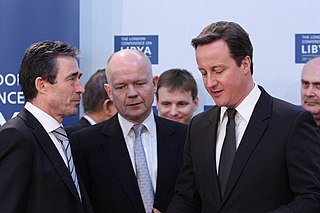 W
WThe London Conference on Libya was an international meeting of government representatives in London on 29 March 2011 to discuss intervention in the Libyan Civil War on behalf of the National Transitional Council. Attendees included foreign ministers and leaders from the United Nations, the League of Arab States, the Organisation of Islamic Cooperation, the European Union and NATO. The meeting was chaired by the British Foreign Secretary William Hague. While leaders of the Libyan opposition including Mahmoud Jibril were consulted prior to the conference, they did not attend.
 W
WThe Magarha is one of the major Arab tribes of Libya. They originate from Fezzan province of Libya and have been an influential supporters and beneficiaries of Muammar Gaddafi during his long rule and then Libya's 2011 civil war. Some Magarha have relocated to Sirte and elsewhere along the coast.
 W
WThe Martyrs' Square ; known as Green Square under the Gaddafi government; Independence Square during the monarchy; and originally known as Piazza Italia is a downtown landmark at the bay in the city of Tripoli, Libya. The main commercial center of the city surrounds the square. The Square is also a main tourist attraction in Tripoli.It has a large legendary fountain done by an Italian architect at the centre of the square. The square is the meeting point of many different avenues. Omar Mukhtar Avenue is one of the longest in North Africa, it was built by Italians in the colonial time, and Libyans during the era of King Idris I. Independence Street branches from the square too, and it leads to the Palace of King Idris I. 24 December Avenue is also an Italian built avenue. Mizran Street is the last street that branches from the Martyrs' Square.
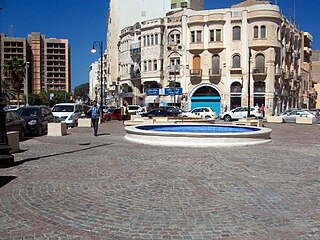 W
WMaydan al-Shajara, is a major town square in Benghazi, the second largest city in Libya. A large native Atlas Cedar tree was located in the center of the square, giving it its name. The square is located in the center of Benghazi, linking two primary roads, Gamal Abdel al-Nasser Street and 'Amr ibn al-'As Street.
 W
WMitiga International Airport is an airport in Libya, located about 8 kilometres east of Tripoli's city centre.
 W
WThe National Conference for the Libyan Opposition (NCLO) was a Libyan opposition organization during the later years of the Gaddafi government. Its stated goal was to bring "an end to tyranny and the establishment of a constitutional and democratic legitimacy" to Libya. The NCLO was formed in 2005 and helped to organize some of the initial protests which led to the Libyan Civil War.
 W
WThe National Front for the Salvation of Libya (NFSL) was a political opposition group active during the rule of the Gaddafi regime in Libya. It was formed in 1981 and called for major liberalising reforms such as democratic elections, a free press, and the separation of powers. During the 1980s, it pursued a campaign of armed opposition to the Gaddafi regime and made several coup attempts, the most notable being its 1984 armed assault on Gaddafi's Bab al-Azizia compound in Tripoli. After the failure of this and several other coup attempts the group largely abandoned militancy, and instead used peaceful tactics to promote reform in Libya; in 2005, the NFSL joined with six other groups to form the National Conference for the Libyan Opposition.
 W
WThe National Liberation Army, formerly known as the Free Libyan Army, was a Libyan military organisation affiliated with the National Transitional Council, which was constituted during the First Libyan Civil War by defected military members and civilian volunteers, in order to engage in battle against both remaining members of the Libyan Armed Forces and paramilitia loyal to the rule of Muammar Gaddafi. It had prepared for some time in portions of Eastern Libya controlled by the anti-Gaddafi forces for eventual full-on combat in Western Libya against pro-Gaddafi militants, training many men before beginning to go on the offensive. They have battled for control of Benghazi, Misrata, Brega, Ajdabiya, Zawiya and Ra's Lanuf as well as several towns in the Nafusa Mountains. They finally began the Battle for Tripoli in August 2011 when they attacked from the west of the city, as well as fomenting an internal uprising on 20 August.
 W
WThe National Transitional Council of Libya, sometimes known as the Transitional National Council, was the de facto government of Libya for a period during and after the Libyan Civil War, in which rebel forces overthrew the Libyan Arab Jamahiriya of Muammar Gaddafi. The NTC governed Libya for a period of ten months after the end of the war, holding elections to a General National Congress on 7 July 2012, and handing power to the newly elected assembly on 8 August.
 W
WThe Network of Free Ulema – Libya is a group of senior religious leaders, or ulama, from all areas of Libya. Due to the persistent's security constraints with families and associates of those opposing Muammar Gaddafi being taken hostage none of the names of members have been released. However, they have been very vocal in the international media throughout the Libyan Civil War, releasing a constant stream of statements, appeals, calls, endorsements, responses and fatwas. Since the liberation of Libya the Network of Free Ulema have formed a larger organization of Libyan religious scholars called the League of Libyan Ulema, headed by Sheikh Umar Abdul Hamid al Mawlud.
 W
WThe People's Hall was a large government building in Tripoli, Libya, constructed in the 1970s/80s. It was the meeting place of the Libyan General People's Congress. It was normally closed to the general public.
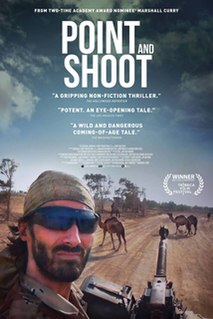 W
WPoint and Shoot is a 2014 documentary film written and directed by Marshall Curry. It was produced by Marshall Curry, Elizabeth Martin and Matthew VanDyke.
 W
WThe timeline of the First Libyan Civil War begins on 15 February 2011 and ends on 20 October 2011. It begins with a series of peaceful protests, similar to others of the Arab Spring, later becoming a full-scale civil war between the forces loyal to Muammar Gaddafi's government and the anti-Gaddafi forces. The conflict can roughly be divided into two periods before and after external military intervention authorized by United Nations Security Council Resolution 1973.
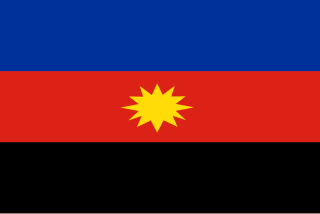 W
WThe Toubou Front for the Salvation of Libya is a group created in mid-2007 to defend the rights and interests of the Toubou people in Libya. It is led by Issa Abdel Majid Mansur, a Libyan Toubou tribal leader, and has its headquarters in Oslo, Norway. The group, which had participated in the Libyan Civil War on the NTC side, was disbanded in August 2011, with the fall of Tripoli. Despite that, the group was revitalized in March 2012, with the aim of "protect the Toubou from ethnic cleansing", following early 2012 deadly clashes between Toubou and Arab militias in southern Libya, which caused the loss of hundreds of lives.
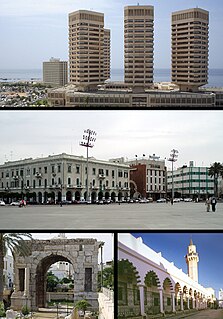 W
WTripoli is the capital and largest city of Libya, with a population of about three million people in 2019. It is located in the northwest of Libya on the edge of the desert, on a point of rocky land projecting into the Mediterranean Sea and forming a bay. It includes the port of Tripoli and the country's largest commercial and manufacturing center. It is also the site of the University of Tripoli. The vast Bab al-Azizia barracks, which includes the former family estate of Muammar Gaddafi, is also located in the city. Colonel Gaddafi largely ruled the country from his residence in this barracks.
 W
WThe Tripoli Revolutionaries Brigade or Free Tripoli Guardian was a unit of the National Liberation Army of Libya created during the Libyan Civil War that merged into the Tripoli Protection Force. Originally formed in April 2011 in the opposition stronghold of Benghazi, it later relocated to the Nafusa Mountains, then the closest frontline to Tripoli, before advancing into the city itself in August.
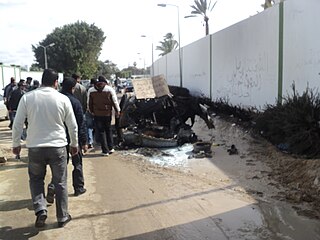 W
WUnited Nations Security Council Resolution 1970 was a measure adopted unanimously by the UN Security Council on 26 February 2011. It condemned the use of lethal force by the government of Muammar Gaddafi against protesters participating in the Libyan Civil War, and imposed a series of international sanctions in response.
 W
WResolution 1973 was adopted by the United Nations Security Council on 17 March 2011 in response to the First Libyan Civil War. The Security Council resolution was proposed by France, Lebanon, and the United Kingdom.
 W
WUnited Nations Security Council Resolution 2009 was unanimously adopted on 16 September 2011.
 W
WUnited Nations Security Council Resolution 2016 was unanimously adopted on 27 October 2011. Recognizing the "positive developments" in Libya after the Libyan Civil War and the death of Muammar Gaddafi, the resolution set a date of termination for the provisions of Security Council Resolution 1973 which allowed states to undertake "all necessary measures" to protect civilians and which formed the legal basis for military intervention by a number of foreign states. The termination date was set at 23:59, Libyan local time on 31 October 2011. The no-fly zone created with Resolution 1973 was also lifted on that date.
 W
WVoice of Free Libya is the name used by three radio stations aligned to the anti-Gaddafi forces that began broadcasting in February 2011, operating from the cities of Benghazi, Bayda and Misrata. They played an important role in the Libyan Civil War and have continued to broadcast after the fall of Gaddafi.
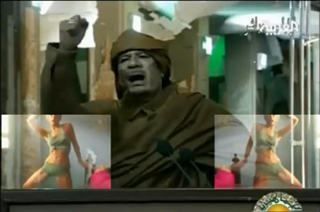 W
WZenga Zenga is an auto-tuned song and viral YouTube video that parodied the Libyan leader Muammar Gaddafi. The song, released on February 22, 2011, quickly became popular among the Libyan opposition active in the 2011 Libyan civil war.